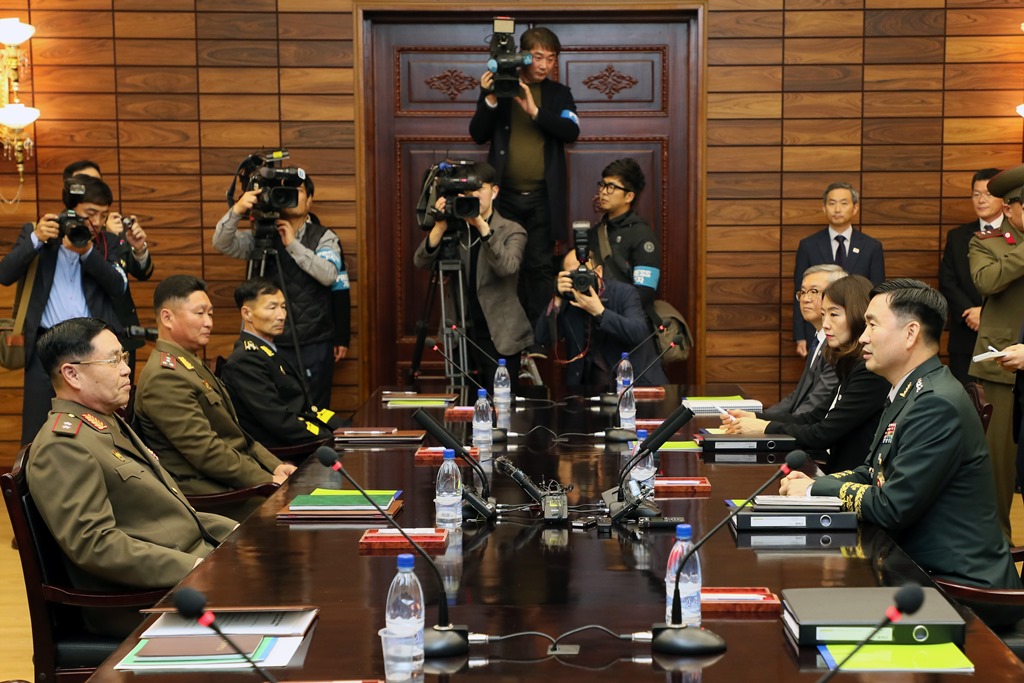Prospects for Breaking the Deadlock in the North Korea-U.S. Dialogue

After the unprecedented meeting between North Korea’s Kim Jong Un and U.S. President Donald Trump in Singapore in June 2018, in the following months, differences in their views regarding the implementation and details of the summit provisions arose. Their mutual distrust and fundamentally contradictory interests have led to stiffer negotiating positions resulting in mutual lack of inclination to take risks or make concessions. As a result, the Kim-Trump meeting in Hanoi in February ended without an agreement. The overestimation of the value of a summit formula without prior arrangements at the working level was also to blame.
Positions on Denuclearisation
In light of statements by representatives of the Trump administration and the North Korean Ministry of Foreign Affairs, it can be concluded that the attitude of both sides in Hanoi was uncompromising and based on maximalist demands. The U.S. opted for a “big deal” that will require North Korea to give up not only its nuclear programme but also its arsenal of ballistic missiles and biological and chemical weapons. The U.S. also proposed access of American observers to other nuclear complexes besides the one at Yongbyon. Only when these conditions were met would the U.S. gradually lift the sanctions imposed on the North. On the other side, North Korea pushed for a phased, step-by-step approach, offering the U.S. the permanent closure of the facilities at Yongbyon in exchange for the lifting of sanctions imposed by the UN Security Council after 2016, which have been the most severe for the North Korean economy.
Another problem is the sides’ different understanding of the scope of denuclearisation. For the U.S., it means the comprehensive, verifiable, and irreversible dismantling of the North Korean nuclear programme, not just disabling and destroying existing nuclear weapons but also all fissile material stocks and the facilities needed for nuclear weapons production, under the control of international observers. In contrast, North Korea maintains only a commitment to the denuclearisation of the Korean Peninsula, pointing to its demand to eliminate the “nuclear threat” on the peninsula and blaming the U.S. for the situation. From the North Korean point of view, its conditions for denuclearisation are an end to the hostility in relations with the U.S. and obtaining security guarantees from it. In this regard, North Korea expects the U.S. to limit its military presence both on the peninsula and in undefined “surrounding areas.” The North is counting on the removal of the American nuclear umbrella from South Korea and undermining its alliance with the U.S.
Changes in North Korea’s Approach
After the summit in Hanoi, the North Korean rhetoric has been exacerbated. During the inaugural session of the newly elected parliament, on 13 April, Kim stated that the North will wait until the end of this year for the U.S. to change its attitude to the talks and move away from its “unilateral demands.” In the North Korean announcements there were also demands calling for the removal of U.S. Secretary of State Mike Pompeo and presidential National Security Advisor John Bolton from the nuclear negotiations. After the Hanoi summit, North Korea emphasized that the lifting of sanctions is not its main goal, rather that it expects security guarantees from the U.S. This serves to take the wind out of the U.S. sails, which treats the sanctions as its main tool to influence North Korea.
To strengthen its position in the talks with the U.S., North Korea has revived relations with Russia: at the end of April, in Vladivostok, Kim met with President Vladimir Putin. Russia has supported North Korea’s phased approach to denuclearisation. At the beginning of May, though, the North carried out its first rocket tests since November 2017, most likely a short-range ballistic missile, a copy of the Russian Iskander type.
South Korea’s Role
The stalemate in the North Korea-U.S. talks undermines the importance of Moon Jae-in’s administration as a mediator in the talks. The South Korean president’s attempts after the summit in Hanoi to restart the North Korean-U.S. dialogue have not been effective. During a meeting in Washington in April, Moon failed to persuade Trump to ease the sanctions on the North, needed to initiate inter-Korean economic cooperation, and to move away from the idea of a “big deal” on the nuclear issue. Deadlock in the North Korea-U.S. talks puts into question the meaning of the next inter-Korean summits Moon is seeking. The North, seeing that Moon has no influence on Trump’s moves, in recent weeks has undermined the need to engage South Korea in the North Korea-U.S. talks.
Conclusions and Perspectives
The North Korea-U.S. negotiations did not bring any progress in solving the nuclear problem on the Korean Peninsula. The sides failed to develop a common definition of denuclearisation, verification procedures, or a schedule for the entire process. Maximalist demands and unwillingness to compromise may indicate that, despite the mutually declared will to continue the talks, neither side is interested in finding an optimal solution to the nuclear problem.
The current negotiation approaches of both sides are based on incorrect assumptions. The U.S. mistakenly assumes that pressure and sanctions will force North Korea to give up its nuclear weapons. Meanwhile, as the recent rocket tests and satellite images of the Yongbyon complex indicate, regardless of the talks, North Korea is expanding its nuclear and missile capabilities, and in the present situation, the U.S. is unable to stop this work. In turn, the North erroneously calculates that in exchange for limited steps on the nuclear issue it will gain significant benefits from the U.S. The closure of the nuclear facilities in Yongbyon with the participation of American observers was a relatively moderate concession that North Korea was ready to make in exchange for the lifting of the toughest sanctions.
The continuation of the deadlock in the North Korea-U.S. dialogue may lead to rising tensions on the peninsula. While an intentional attack by either side is unlikely, an escalation caused by a North Korean mistake or provocation (such as nuclear tests in the ocean or long-range missiles) could quickly get out of control, and U.S. military action cannot be ruled out. In this situation, the resumption of dialogue between the two countries would reduce the risk of escalation, as seen in 2017.
The dialogue should instead focus on issues other than complete denuclearisation, assuming though that it is the ultimate goal. The talks may go in the direction of first freezing and then the gradual reduction of the North Korean nuclear programme rather than straight to dismantling it. The first step could be to gain access for observers to the facilities in Yongbyon and documentation from the North on its other nuclear complexes. In return, the U.S. could consider a limited easing of the sanctions, preferably in the form of a waiver that would allow inter-Korean economic cooperation to resume. The offered concessions would be reversible and depend on North Korea fulfilling its obligations. Another component of the talks necessary to build trust in relations would be the adoption of an end-of-war declaration and establishing a U.S. liaison office in Pyongyang.
For the implementation of these objectives, more policy flexibility from both North Korea and the U.S. will be needed, though right now that seems unlikely. The North’s rocket tests in May show that it intends to escalate the situation to induce the U.S. to make concessions. On the other hand, some in the Trump administration, especially Bolton, are still strongly of the mind that North Korea must change its position first. To this end, the U.S. is more likely to return to the policy of “maximum pressure” than make concessions.
Maintaining a policy of pressure and sanctions on the North threatens to deepen its isolation and lead to a deterioration in living conditions. This could weaken any reform-minded forces, including those who are close to Pak Pong Ju, who was premier in 2013-2019,and is currently the vice-chairman of the party responsible for economic affairs. The latest World Food Programme report indicates that sanctions are one of the factors that have a negative impact on the food situation in North Korea, which is the worst in a decade. Isolating the North also means that it may be willing to strengthen ties with China and Russia. Consequently, this will reduce the ability of western countries to influence North Korea in a way other than through sanctions.





